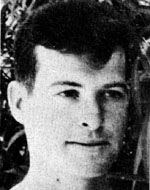Tuchover, Omri
Son of Avraham and Lilo. He was born on the 18th of Tishrei, 5709 (October 18, 1948) in Giboram. Omri was born at the time of the opening of the road to the Negev during the War of Independence, when Gvaram was detached from the Yishuv, but at the age of six months he was returned to Gvaram. In his kibbutz he attended elementary school and completed his studies there. He then completed his studies in the first two grades of the local high school and the 11th and 12th grades at the school in Bari. He belonged to the kibbutz division of the Hanoar Haoved movement. He would do sports, especially swimming and diving. During the Kinneret he participated for several consecutive years (even in the army). To travel in a very loved country. He also liked to listen to good music, to sing and to space in the recorder. Omri also reached out with his pen and edited the brigade’s diary in Giboram for several years; He put the diary up to the right level. In school, in sports and in music he excelled never was superficial excellence and did not like to make it unfinished. Everything gave him surprising ease. It was enough for him to hear or see something once and his memory kept him. The quick perception, the ability to think and reason were among the most prominent traits. But he was humble and disinterested, and in the army he was not among the marchers even though he had all the facts. The person who eulogized him on his grave in the name of his friends in the kibbutz said: “He did not chase ranks and never boasted of his deeds.” He was drafted into the IDF in November 1966. He was drafted into the Armored Corps, but later moved to the Armored Corps, during which he went to the Armored Corps once, while Omri saw a Yaffa flower in front of him and at the same time he called him “Do not step on the flower.” Then Omri said that he had proved his emotional sensitivity because it was clear that there was no need to step on the flower, but he was also very Simcha that the guide had also set his Lev on the flower: Omri did not like wars and did not want to see bloodshed. , But despite this he went to military service with the knowledge that his duty was above all. After it. Afterward, they suggested that he continue to advance – and Omri agreed to go to the officers’ course. At the end he joined a combat battalion that was parked on the banks of the Suez Canal and spent the rest of his life in this battalion. He also played the role of a welfare officer and his subordinates poured out all his Lev; Some thought him to be a father. Omri spent a long time on the canal line and showed great courage during the incidents. As the commander of a platoon, which was divided into two bunkers and the connection between them cut off, Omri held the knot and ran from bunker to bunker, exposed to the fire of the enemy with concern for the safety of his men. When he came home on holiday, and not often, did not talk much about his actions on the front. Omri was subjected daily to incidents of fire and snipers and some of his men, whom he had become a symbol and a model as he went before them, fell. But on April 14, 1969, Omri fell in a canal incident during an exchange of fire with the enemy. He was laid to rest in the cemetery at Gibram. Omri proved himself to be an excellent soldier and an excellent commander. He was promoted to lieutenant after they fell. Even his commander said of his grave: “Your comrades in arms could not abandon the positions in the canal because the fire is raging there today, and we have become accustomed to the IDF that we always go out together, but we do not always come together. This is our fate – and its members will continue the mission. “After they fell, Hakibbutz Hameuchad Publishing House published a booklet in his memory called” Omri “.
